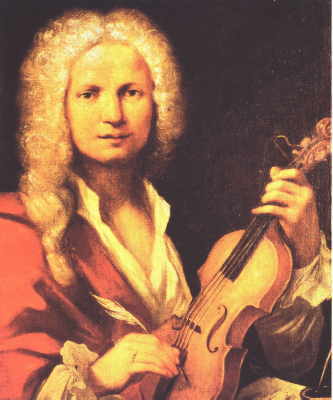
“New” Vivaldi concerto gets Florida premiere
One of the more exciting musicological discoveries of 2010 comes to life this weekend when a Miami-based Baroque flutist performs a long-lost concerto by Antonio Vivaldi.
The concerto, called “Il Gran Mogol,” apparently was written in the late 1720s as part of a collection of four flute concerti honoring various potentates; this one would have been for an Indian ruler, and the others, which are still lost, were intended for nobles from Spain, France and England (here’s the story from England’s “Guardian” newspaper).
A British musicologist found it in the national archives of Scotland, where it was part of a group of papers belonging to a noble family, one of whose members appears to have bought it during the 1730s and brought it back home, where it has been ever since.
The concerto will get its Florida premiere Sunday in Delray Beach, when the Camerata del Re ensemble at St. Paul’s Episcopal Church will close its concert of Italian Baroque music with the piece. The soloist will be Dr. Robert David Billington, a freelance flutist and teacher who also performs in the orchestra for the Miami Lyric Opera.
Billington said he got the opportunity to play the piece when he and Camerata founder Keith Paulson-Thorp were looking for appropriate pieces to program for the concert. And they found their answer online.
“I read a little about it on the Internet,” Billington said. “Keith was trying to figure out what to play, and so I looked for this piece. The score is available, but not the parts, so we had to scan it into Finale [a music-notation software] and print them out. But we read about it, and saw it, on the Internet.”
Billington said it’s a lovely little piece.
“It’s really nice. Of course, I love the Op. 10 concertos,” he said, referring to the well-known set of six flute concertos by Vivaldi. “It’s hard to describe. It’s got its own affect, and the slow movement is beautiful.”
One thing that’s particularly effective is how Vivaldi pits the flute solo against the orchestra part, he said. But the music doesn’t have any aural reference to the music of northern India, such as the use of harmonic-minor scales, he added.
The Baroque flute, which is made of wood, has a more intimate, mellow sound than the modern flute, which in North America is usually made of silver.
“The Baroque flute has certain characteristics that are extremely well-suited for the music,” Billington said. His flute is made of ebony and the Camerata will be playing the music at a lower pitch than what we’re accustomed to today (middle A = 415 cycles per second, as opposed to 440 cycles per second). “At that pitch it sounds much more mellow.”
Billington said he believes there’s plenty of fine music for the flute that has vanished from the repertory because it was originally intended for the Baroque version of the instrument, and it doesn’t translate well to contemporary flutes.
“It just doesn’t sound the same,” said Billington, who added that he now has three students of the Baroque flute.
Sunday afternoon’s concert also includes rarities, such as a harpsichord sonata by Anna Bon di Venezia, a talented woman composer from a musical family who worked for royal employers in Bayreuth and Eisenstadt (and who vanishes from the historical record in 1767, when she was married). Soprano Karen Neal will sing music by Vivaldi (“Povero mio cor”), Giovanni Riccio (“Jubilent omnes”), Francesco Mancini (“Quanto dolce e quell’ ardore”) and Billington will be the soloist in “Three Ayres,” by Geminiani.
There’s also music by Attilio Ariosti, Florentio Maschera, Biagio Marini and Cristiano Lidarti. The concert begins at 3 p.m. Sunday at St. Paul’s, which is on Swinton Avenue just off the Atlantic Avenue business district in Delray Beach. Tickets are $15 and $20, depending on seating. Call 561-278-6003, or visit www.stpaulsdelray.org.
Recent Content
-
Artsarticle ·
-
Artsarticle ·
-
Artsarticle ·

